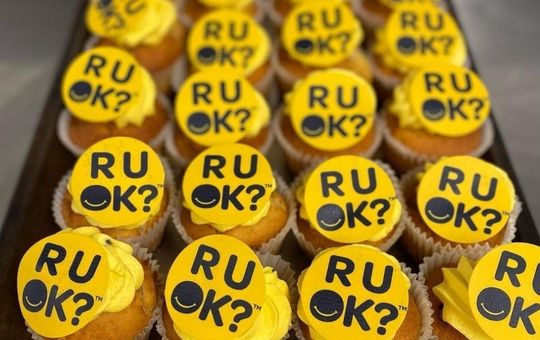Asking “Are you ok?” in the workplace is equally important as asking the question of your family and friends.
Besides an employers legal responsibility of providing a safe and healthy workplace, “R U Ok?” conversations can make a real difference to members of your team who may be going through a tough time.
It’s a question that really should not be left until national R U Ok day to ask.
R U OK Day.
R U OK? is a harm prevention charity that encourages people to stay connected and have conversations that can help others through difficult times in their lives.
R U OK? delivers free resources that increase the willingness and confidence of all Australians to recognise the signs someone is struggling, start a genuine conversation and lend appropriate support.
When we talk about mental health it is often taken to refer only to mental health disorders (e.g., major depressive disorder or an anxiety disorder). But mental health actually refers to how well a person is in their thinking, managing their emotions, relating to others, and generally meeting the demands of everyday life and employment. In other words, it is a continuum, with one end marked by mental health disorders, progressing to functioning without mental health symptoms, and then through to a state of wellbeing – where an individual is thriving. At the wellbeing end of the continuum, they are engaged successfully in their personal life and work, have rich social interactions, experience a sense of enjoyment and contribute to their community.
Why is mental health important in the workplace?
Workplaces depend on workers’ thinking abilities and interactions with other people. How well a person performs in a team, relates to a customer or deals with daily challenges – all have to do with their state of mental health or wellbeing.
It is no surprise therefore that positive links have been found between the health and wellbeing of employees and productivity and performance.
In addition, work is so important for most people because of the amount of time they spend there and it is such a big part of who they are and how it enables them to live, learn and grow. Work itself therefore has a potential impact on people’s mental health – the way it is organised, how people are managed and how well the work environment functions. Generally, healthy work has a positive impact on people’s mental health and wellbeing. The mental health of people engaged in work is up to four times better than people experiencing ongoing unemployment.
It is important therefore for all managers to be aware of the role that everyone’s mental health plays in influencing overall workplace performance and to protect employees mental health at work and promote positive wellbeing.
What is work stress?
Stress is sometimes confused with anxiety but it is a not a mental illness. It is a state of physical and mental tension, a kind of state of readiness to respond to situations that may be overwhelming or threatening us, either at work or in our personal lives. If it is thought of as “pressure” then, within limits it can have a positive impact. For example, if one experiences too little demand or pressure, then they may not be motivated enough. Just enough pressure e.g. through having a reasonable deadline or needing to learn new skills means that we can grow and have a sense of fulfilment.
Mental health in the workplace resources for employers
R U OK? has released new valuable resources to encourage more business leaders, owners and employees to build an R U OK? Culture in their workplace so that everyone feels safe, supported and encouraged. You can visit the R U OK? website here.
Mental Health and Wellbeing in the Workplace – Harvest HR Webinar series
Understanding Mental Health in the Workplace (work stress signs)

